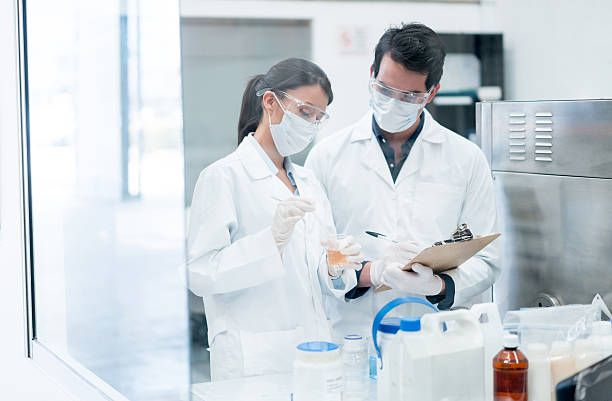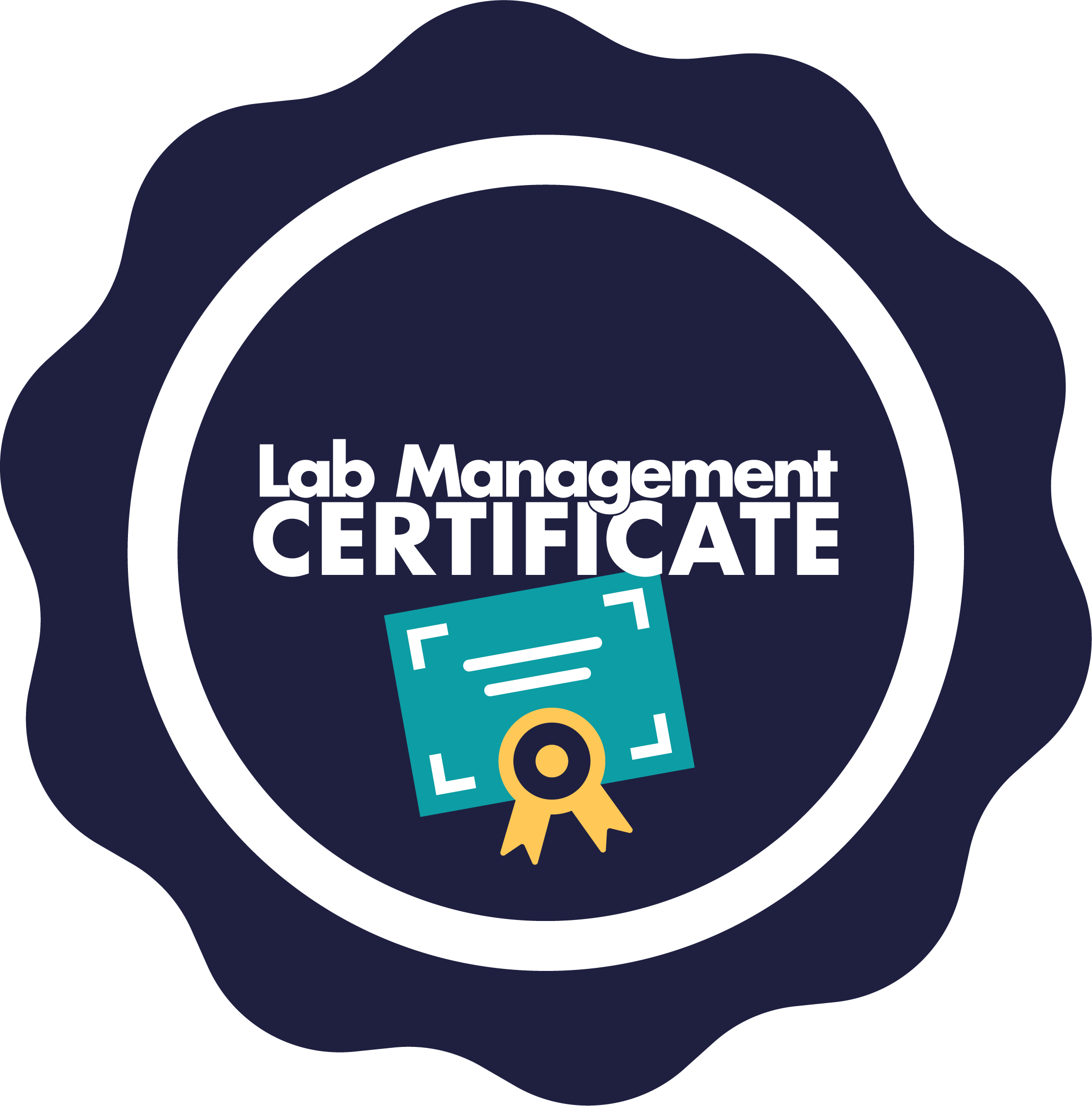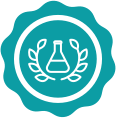Key management training for current and aspiring lab leaders

Take charge of your lab’s success.
Lab Management Certificate
The Lab Management Certificate is intended to support existing and potential lab managers with training in a wide variety of leadership and management skills.

What's included?
20 expert-led, self-paced courses
Whether you are a seasoned lab manager or seeking career advancement, the Lab Management Certificate will equip you with the tools you need to effectively lead and manage your lab.
What is this certificate about?
Who is this certificate for?
What are the benefits of this certificate?
By completing the Lab Management Certificate, engaged learners will gain:
Ashley Wolfe
Laboratory Assistant Manager / Quality Assurance
Laboratory Services, Water Department, City of Arlington, Texas
Laboratory Services, Water Department, City of Arlington, Texas
Write your awesome label here.
Are you struggling with...
-
Feeling under-prepared for your role
-
Learning on your own and on the fly with little training
-
Dealing with the stress of avoiding mistakes, which can lead to poor outcomes
-
Managing a team with a lack of conflict management training
-
Securing the capital investment needed for your lab
Why invest in this program?
Specialized Skill Enhancement
Acquire specialized lab management skills, making you a more qualified candidate for promotions, leadership roles, and increased responsibilities within your organization.
Real-World Relevance
Gain practical skills that empower you to immediately apply effective lab management strategies, resulting in more efficient operations, improved team performance, and a culture of continuous improvement.
Four-Stream Approach
Tailor your educational path to focus on skills that matter most to you, ensuring personal growth while achieving your career objectives.
Enhanced Career Opportunities
Achieve a recognized certification that boosts your professional credibility and opens doors for career advancement within your organization and the industry.
Accelerated Learning with Expert Instruction
Gain valuable insights from seasoned lab management professionals to fast-track your understanding of leadership strategies and their real-world applications.
Work-Life Balance
Enjoy the flexibility of a self-paced learning format that eliminates scheduling constraints, making it easier to improve your skills without disrupting your daily life.
What are the unique features of the certificate?
Johnny Farnen
Laboratory Manager
College of Science & Technology, Bellevue University, Nebraska
Lead with Confidence, Manage with Expertise—Your Lab Career Starts Here.
Develop critical leadership and management skills tailored for lab environments. Gain practical tools to manage teams, optimize processes, and drive innovation in your lab.
Write your awesome label here.
Meet the instructor
Jered Meyers
Senior Associate Scientist
Janssen Pharmaceuticals
Janssen Pharmaceuticals
Completing this certificate will help you...

Lab Management Certificate Curriculum
Not ready for the full certificate? The 4 stream credentials below can also be taken separately
Stream Credential
How to Manage Lab Staff
People are the heart of every lab, driving its discoveries and outcomes. To foster success, lab managers must cultivate strong leadership skills that empower their teams to thrive. The How to Manage Lab Staff stream equips lab managers with the vital tools they need to lead effectively.
This program covers key areas such as foundational leadership principles, recruitment strategies, seamless onboarding, performance management, and succession planning.
Each course is designed to provide lab managers with the expertise to nurture and develop their teams, ensuring their lab’s success.
This program covers key areas such as foundational leadership principles, recruitment strategies, seamless onboarding, performance management, and succession planning.
Each course is designed to provide lab managers with the expertise to nurture and develop their teams, ensuring their lab’s success.
Stream Credential
How to Be A Better Lab Leader
Leadership sets the tone for a successful lab environment. The How to Be a Better Lab Leader stream is designed to help lab managers elevate their leadership capabilities and create a thriving, engaged team.
This five-course program focuses on building essential leadership skills, fostering employee engagement, understanding diverse personality types, mastering positive communication, and managing conflicts with confidence.
Whether you're an experienced lab manager or aspiring to lead, this program equips you with the tools to cultivate a supportive culture and drive success within your lab.
This five-course program focuses on building essential leadership skills, fostering employee engagement, understanding diverse personality types, mastering positive communication, and managing conflicts with confidence.
Whether you're an experienced lab manager or aspiring to lead, this program equips you with the tools to cultivate a supportive culture and drive success within your lab.
Stream Credential
How to Improve Lab Management
Managing a lab requires navigating complex decisions that impact both the team and the lab’s mission. The How to Improve Lab Management stream provides lab managers with essential skills to lead with confidence and make effective, data-driven decisions.
This comprehensive program includes five strategically crafted courses covering key topics such as decision-making, change management, negotiation, networking, and influence-building.
Whether you're a current or aspiring lab manager, this stream will enhance your ability to lead and make a meaningful impact.
This comprehensive program includes five strategically crafted courses covering key topics such as decision-making, change management, negotiation, networking, and influence-building.
Whether you're a current or aspiring lab manager, this stream will enhance your ability to lead and make a meaningful impact.
Stream Credential
How to Improve Lab Operations
Efficient lab management is the cornerstone of delivering reliable results. The How to Improve Lab Operations stream at Lab Manager Academy provides lab managers with the tools to optimize quality, safety, asset management, advocacy, and productivity in their labs.
This comprehensive five-course program covers the fundamentals of implementing quality systems, maintaining a robust safety program, managing equipment and instruments, effectively advocating for lab resources, and leveraging metrics to boost productivity.
Designed to support both seasoned lab managers and those aspiring to lead operations, this stream equips participants with practical strategies to enhance efficiency and drive success.
This comprehensive five-course program covers the fundamentals of implementing quality systems, maintaining a robust safety program, managing equipment and instruments, effectively advocating for lab resources, and leveraging metrics to boost productivity.
Designed to support both seasoned lab managers and those aspiring to lead operations, this stream equips participants with practical strategies to enhance efficiency and drive success.
Ready to get started?
Lab Manager Academy is accredited by the International Accreditors for Continuing Education and Training (IACET) and offers IACET CEUs for its learning events that comply with the ANSI/IACET Continuing Education and Training Standard. IACET is recognized internationally as a standard development organization and accrediting body that promotes quality of continuing education and training.







